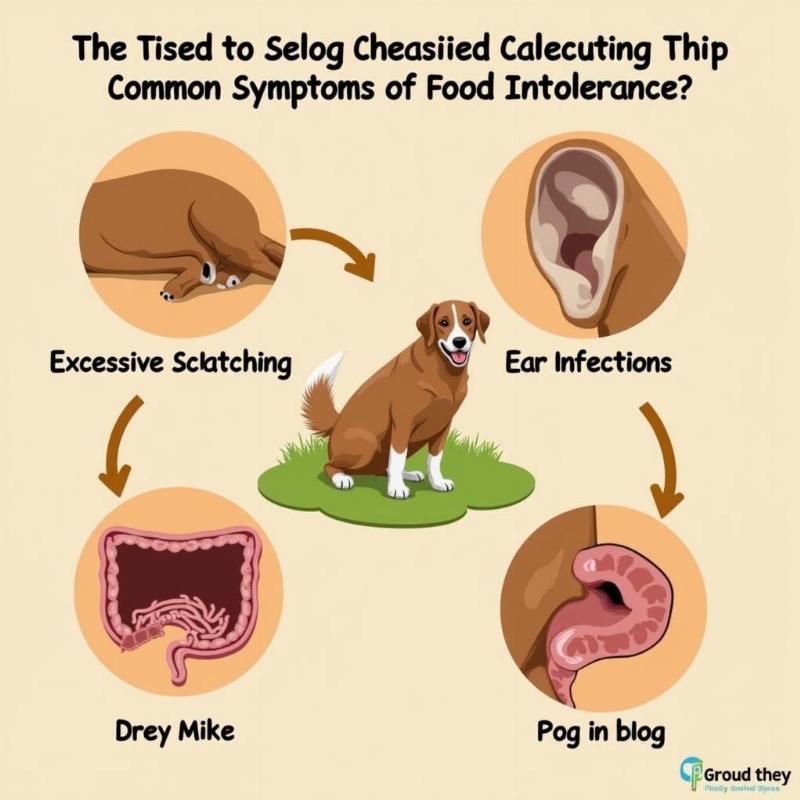If your dog’s fart smells like rotten eggs, it’s likely a sign of something going on in their gut. While occasional stinky gas is normal for dogs, a persistent sulfurous smell can indicate dietary issues, digestive problems, or even more serious health concerns. This article will explore the common causes of why your dog’s farts smell like rotten eggs, offer solutions, and advise when it’s time to seek veterinary care.
Decoding the Rotten Egg Smell: Understanding the Science Behind Dog Farts
The pungent rotten egg smell comes from hydrogen sulfide gas, a byproduct of bacteria breaking down food in the gut. A small amount is normal, but an excess indicates an imbalance. This imbalance could be due to several factors, and understanding them is key to helping your furry friend.
Dietary Culprits: What Your Dog Eats Matters
What your dog eats plays a crucial role in their digestive health. Certain foods are more likely to produce hydrogen sulfide. High-sulfur foods like eggs, meat, and some vegetables can contribute to smelly farts. Another culprit could be a diet high in fiber. While fiber is beneficial, too much can lead to increased gas production and that dreaded rotten egg smell. Switching to a high-quality dog food formulated for sensitive digestion might help.
Food Intolerances and Allergies: When Your Dog’s Gut Says No
Just like humans, dogs can develop intolerances to certain ingredients in their food. Common culprits include grains, dairy, and even some protein sources. These intolerances can lead to inflammation in the gut, resulting in increased gas and a foul odor. If you suspect a food intolerance, consult your vet about an elimination diet to pinpoint the problem ingredient.
 Dog showing symptoms of food intolerance
Dog showing symptoms of food intolerance
Digestive Issues: Beyond the Diet
Beyond dietary factors, underlying digestive issues could be the cause. Conditions like inflammatory bowel disease (IBD) or pancreatitis can disrupt normal digestion, leading to increased gas production and that telltale rotten egg smell. Parasites like Giardia can also cause foul-smelling diarrhea and gas.
When to Worry: Signs It’s More Than Just a Stinky Fart
While occasional rotten egg farts might not be a cause for immediate concern, certain accompanying symptoms warrant a vet visit. If your dog is experiencing persistent gas along with vomiting, diarrhea, loss of appetite, lethargy, or abdominal pain, it’s crucial to seek professional help. These could be signs of a more serious underlying condition requiring prompt veterinary attention.
Addressing the Issue: Tips to Reduce Rotten Egg Farts
- Dietary Changes: Transitioning to a high-quality, easily digestible dog food can make a significant difference. Consider a limited ingredient diet to help pinpoint any food intolerances.
- Probiotics: Adding probiotics to your dog’s diet can help restore the balance of good bacteria in their gut, reducing gas and improving overall digestion.
- Regular Exercise: Keeping your dog active can promote healthy digestion and reduce gas buildup.
- Hydration: Ensure your dog has access to fresh water at all times to help flush out their system.
Conclusion: Tackling the Stinky Situation
Dealing with a dog whose farts smell like rotten eggs can be unpleasant, but addressing the underlying cause is crucial for their health and well-being. By understanding the potential causes, ranging from dietary factors to digestive issues, you can take steps to improve your dog’s comfort and eliminate the offensive odor. If the problem persists or is accompanied by other symptoms, don’t hesitate to consult your veterinarian.
FAQ: Your Burning Questions About Dog Farts Answered
- How often should a dog fart? Some gas is normal, but excessive or constant farting could indicate a problem.
- Can changing dog food suddenly cause smelly farts? Yes, sudden dietary changes can disrupt the gut flora, leading to increased gas.
- Are certain dog breeds more prone to gas? Brachycephalic breeds (those with short noses) tend to swallow more air while eating, leading to more gas.
- Can stress cause smelly farts in dogs? Stress can affect digestion and potentially contribute to gas.
- What are some natural remedies for dog gas? Ginger and peppermint can help soothe the digestive system. Always consult your vet before giving your dog any new supplements.
- Is there medication for dog gas? Your vet may prescribe medication for underlying digestive issues contributing to gas.
- Are there over-the-counter products for dog gas? Some gas relief products are available, but always consult your vet before using them.
About Beautdogs.us
Beautdogs.us is your premier online resource for all things dog-related in the USA. We offer expert advice on dog breeds, nutrition, grooming, training, and overall wellness, catering to both new and experienced dog owners. Our goal is to empower you with the knowledge and resources you need to provide the best possible care for your canine companion. For any questions or concerns, please contact our expert team at [email protected] or call us at +1 501-555-7529. Learn more about our services and products at Beautdogs.us.